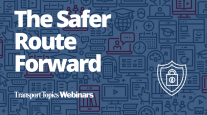Congestion May Add $14 Billion in Costs for Washington State’s Freight Industry
This story appears in the July 9 print edition of Transport Topics. Click here to subscribe today.
A 20% increase in traffic congestion could cause a $14 billion spike in operating costs to the state’s freight-dependent industries, the Washington State Department of Transportation said in a new report.
“The point of this report is to provide decision support,” Barbara Ivanov, co-director of the freight systems di-vision of WSDOT, said. “This is information that trucking executives and the governor and legislature are given so that they have options to consider. This is about considering their future in the interest of the transportation package.”
Out of 1,000 private-sector firms that include both trucking companies and businesses that operate or rely on trucks, the analysis found 56% said they would increase costs for consumers as congestion rose, 19% would absorb the costs and 16% would make internal operational changes to offset the costs. Only 6% would close businesses, leaving 3% to relocate.
“The report says that consumers have to pay trucking companies more for shipping costs to cover the cost of congestion,” Sheri Call, vice president of member services at the Washington Trucking As-sociation, said.
“However,” she said, “the trucking industry can never recover all of the cost burdens. Competition doesn’t always allow us to pass on the full burden of the additional costs we incur, whether it be business taxes or congestion.”
Congestion in Washington has resulted from a variety of issues, WSDOT said in the report. The most prominent are poor timing of traffic control systems, tight turns, narrow bridges and variable speeds adjusted to specific types of traffic.
Especially problematic traffic areas include metropolitan centers and rural areas, locations that receive a large amount of freight shipments, WSDOT said.
Edward Vander Pol, co-president of Oak Arbor Freight Lines in Auburn, Wash., said that additional travel outlets are needed to truly solve congestion problems, beyond simply fixing existing roads.
“Any time people have to spend money, it’s not good for anyone,” Vander Pol said. “Any time our trucks are stuck in traffic, it’s costing more money.
WSDOT’s Ivanov said that state funding for road repairs and construction has totaled $15.3 billion over the past few years, but there is still need to fund more improvements such as traffic signals, public transit, and added roads.
“We want to help people to continue to understand, in a completely transparent way based on enormous sample surveys . . . what could be the consequence of congestion on the economy,” said Ivanov. “Our moving principle is low-cost solutions.”



